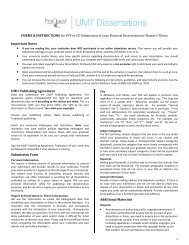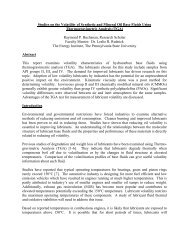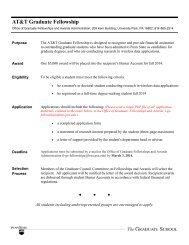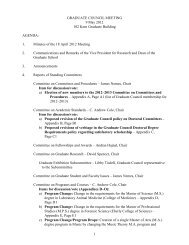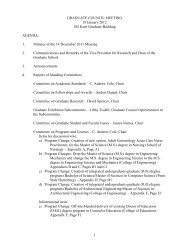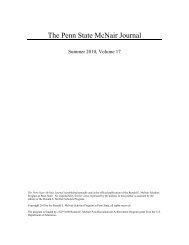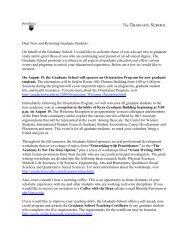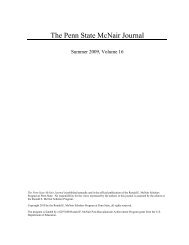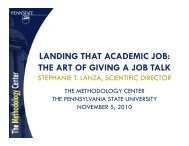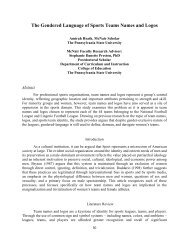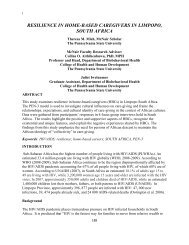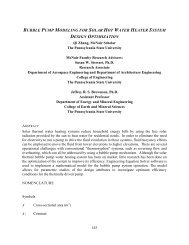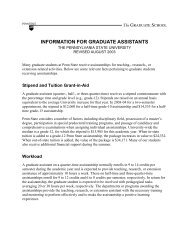When one thinks of a Celtic hero King Arthur ... - the list of offices
When one thinks of a Celtic hero King Arthur ... - the list of offices
When one thinks of a Celtic hero King Arthur ... - the list of offices
You also want an ePaper? Increase the reach of your titles
YUMPU automatically turns print PDFs into web optimized ePapers that Google loves.
The L<strong>one</strong> Soul<br />
Jacqueline Cauley, McNair Scholar, The Pennsylvania State University<br />
Faculty Research Advisor: Dr. Benjamin Hudson<br />
Pr<strong>of</strong>essor <strong>of</strong> History and Medieval Studies<br />
Department <strong>of</strong> History<br />
College <strong>of</strong> Liberal Arts<br />
The Pennsylvania State University<br />
A <strong>hero</strong>’s life is dominated by battles and adventures, with little time for ordinary<br />
matters. No matter how supernatural a <strong>hero</strong> appears, <strong>the</strong>y still have humanly needs, for<br />
example a <strong>hero</strong> needs to eat and needs m<strong>one</strong>y to support <strong>the</strong>ir lives. There is never any<br />
mention <strong>of</strong> a <strong>hero</strong> owning land to cultivate food, inheriting a large sum <strong>of</strong> m<strong>one</strong>y, or<br />
having any source <strong>of</strong> income. A <strong>hero</strong> does live a higher quality <strong>of</strong> life <strong>the</strong>n <strong>the</strong> average<br />
person and <strong>the</strong> pro<strong>of</strong> can be found in both what <strong>the</strong> literature does and does not mention.<br />
<strong>Celtic</strong> culture is a missing aspect <strong>of</strong> European history. The <strong>Celtic</strong> <strong>hero</strong> set <strong>the</strong><br />
standard for accepted masculine behavior. In particular, Irish <strong>hero</strong>es established <strong>the</strong><br />
foundations for knightly chivalry <strong>of</strong> <strong>the</strong> later Middle Ages, which became <strong>the</strong> rules <strong>of</strong><br />
conduct for <strong>the</strong> <strong>of</strong>ficers in modern military establishments. Finally, popular culture has<br />
embraced <strong>the</strong> cult <strong>of</strong> <strong>the</strong> <strong>hero</strong> through action films <strong>of</strong> <strong>the</strong> cinema and <strong>the</strong> comic book<br />
super<strong>hero</strong>.<br />
Every<strong>one</strong> is familiar with <strong>the</strong>se ideas and <strong>the</strong>mes surrounding a <strong>hero</strong>, but <strong>the</strong><br />
aspects that make up a <strong>Celtic</strong> <strong>hero</strong> are different. The <strong>Celtic</strong> <strong>hero</strong> differs in certain ways<br />
such as a delicate balance between honor and aggression, an extraordinary physical<br />
beauty, and, finally limits on <strong>the</strong>ir actions through taboos, which <strong>of</strong>ten are connected with<br />
supernatural contact, both beneficial and malevolent.<br />
This study examines <strong>the</strong> <strong>hero</strong>’s development. Beginning with childhood’s effect<br />
on his personality, which explains why he is different from o<strong>the</strong>r men, <strong>the</strong> focus will be<br />
on Irish <strong>hero</strong>es, as <strong>the</strong>y are found in <strong>the</strong> literature and in <strong>the</strong> historical interpretations <strong>of</strong><br />
modern scholars. The investigation revolves around individuals, who represent marginal<br />
societies and <strong>the</strong>ir names, such as Cú Chulainn, Conaire, and Finn, which are largely<br />
unknown to English-speakers.<br />
Aspects <strong>of</strong> <strong>the</strong> <strong>hero</strong>ic<br />
A <strong>hero</strong>’s life is so extraordinary that it becomes a memorial in itself. A <strong>Celtic</strong><br />
<strong>hero</strong> represents a delicate balance between aggression and honor. Honor and aggression<br />
act as a counterbalance. <strong>When</strong> <strong>the</strong> balance is disrupted, extreme aggression becomes<br />
uncontrollable. Once it takes control <strong>of</strong> <strong>the</strong> <strong>hero</strong>, he becomes feared by enemies and<br />
allies alike. Honor al<strong>one</strong> quells <strong>the</strong> aggression. For example, in <strong>the</strong> “Boyhood Deeds” <strong>of</strong><br />
<strong>the</strong> <strong>hero</strong> Cú Chulainn, his temper is raging when he returns home from his first battle,<br />
fighting for <strong>the</strong> men <strong>of</strong> Ulster. <strong>King</strong> Conchobar <strong>of</strong> Ulster realizes that if Cú Chulainn’s<br />
temper is not calmed, <strong>the</strong>n his people are in extreme danger. The Ulstermen concoct a<br />
plan that exploits Cú Chulainn’s extreme honor, by having <strong>the</strong> women <strong>of</strong> Ulster bare<br />
<strong>the</strong>mselves and march out to Cú Chulainn. This plan combined with three consecutive<br />
8
aths returns Cú Chulainn back to a normal state <strong>of</strong> being. (Cross, 151) The balance<br />
between honor and aggression are restored and life can continue on.<br />
Physical aspects also have a role to play in <strong>the</strong> making <strong>of</strong> a <strong>hero</strong>. Their beauty is<br />
almost a cliché in literature. The descriptions <strong>of</strong> a <strong>hero</strong> include descriptions <strong>of</strong> everything<br />
from height to eye color and physical strengths. Cú Chulainn has “kingly eyes,” with<br />
pearls for teeth and is <strong>the</strong> “comeliest <strong>of</strong> <strong>the</strong> men <strong>of</strong> Erin (Cross 154 and 156).” The <strong>Celtic</strong><br />
<strong>hero</strong> Finn, <strong>the</strong> leader <strong>of</strong> <strong>the</strong> warrior band or Fían in <strong>the</strong> series <strong>of</strong> tales known as <strong>the</strong> “Hero<br />
Cycle <strong>of</strong> Finn Mac Cool,” is described as “tall, fair-haired…with broad shoulders<br />
(Mackillop, 232).” In “The Boyhood Deeds,” Cú Chulainn is able to defeat a hundred<br />
and fifty boys trained in warfare with his bare hands, showing <strong>of</strong>f his amazing physical<br />
dexterity and strength (Cross, 138).<br />
Taboos play a large part in <strong>the</strong> development and actions <strong>of</strong> <strong>the</strong> <strong>Celtic</strong> <strong>hero</strong> in a<br />
way that is almost unique from western traditions. These prohibitions were taken very<br />
seriously in <strong>Celtic</strong> society as demonstrated by literature. The taboos not only helped<br />
guide <strong>the</strong> <strong>hero</strong>es in life but also helped to prevent <strong>the</strong>ir deaths. Violation <strong>of</strong> taboos leads<br />
to disaster. In several cases a <strong>hero</strong> deliberately breaks a taboo even though he knows it<br />
will lead to his death. <strong>When</strong> Conaire, <strong>the</strong> anti-<strong>hero</strong> <strong>of</strong> “The Destruction <strong>of</strong> Dá Derga’s<br />
Hostel,” slowly broke all <strong>of</strong> his taboos, it led him closer to his death <strong>one</strong> step at a time.<br />
Prior to his final battle, Cú Chulainn was forced to break his taboo not to eat dog flesh.<br />
Taboos can limit <strong>the</strong> actions <strong>of</strong> a <strong>hero</strong>, <strong>of</strong>ten for his benefit, and can be placed on<br />
a <strong>hero</strong> at anytime from before birth to o<strong>the</strong>r life changing moments. Conaire has a taboo<br />
placed on him by his o<strong>the</strong>rworldly animal family that he cannot hunt birds, which protect<br />
those uncanny beings in <strong>the</strong> guise <strong>of</strong> birds (Cross, 96). His supernatural origin and <strong>the</strong><br />
advice from his avian kinsmen help him to receive <strong>the</strong> kingship <strong>of</strong> Ireland. An additional<br />
series <strong>of</strong> taboos comes with his new honor, and his disregard <strong>of</strong> <strong>the</strong>m leads to his<br />
inevitable doom. Taboos <strong>of</strong> protection are <strong>of</strong>ten <strong>the</strong> creation <strong>of</strong> a divine power and are<br />
designed to ei<strong>the</strong>r protect <strong>the</strong> <strong>hero</strong> and or those close by, including o<strong>the</strong>r divine beings.<br />
The <strong>hero</strong> Diarmuid <strong>of</strong> <strong>the</strong> Cycle <strong>of</strong> Finn Mac Cool, is given a <strong>list</strong> <strong>of</strong> taboos from his<br />
foster fa<strong>the</strong>r Angus Óg, who is <strong>of</strong>ten associated or believed to be <strong>the</strong> god <strong>of</strong> beauty and<br />
youth (Mackillop, 17). Angus Óg does this to protect Diarmuid in his flight from <strong>the</strong><br />
anger <strong>of</strong> Finn. Among <strong>the</strong>se taboos are that he should never sleep in <strong>the</strong> same place for<br />
more <strong>the</strong>n <strong>one</strong> night and never eat, cook or sleep in <strong>the</strong> same place. (Cross, 382)<br />
Taboos that limit behavior or force <strong>the</strong>m into doing something against <strong>the</strong>ir will<br />
are placed on many <strong>Celtic</strong> <strong>hero</strong>es. Cú Chulainn, for example, has a taboo on him that he<br />
cannot pass a cooking hearth without joining in <strong>the</strong> meal, forcing him to eat every time he<br />
passes <strong>one</strong> (Rees, 327). A classic example comes from <strong>the</strong> story <strong>of</strong> “Diarmuid and<br />
Grainne,” when <strong>the</strong> femme fatale Grainne compels Diarmuid to elope with her. Grainne<br />
puts a taboo <strong>of</strong> danger on Diarmuid that forces him to take her away from her promised<br />
husband Finn. Diarmuid must do her bidding because breaking <strong>the</strong> taboo would cause<br />
him to lose his honor (Cross, 374).<br />
Family<br />
One little discussed aspect <strong>of</strong> a <strong>hero</strong> is his family. An Irish family at this time did<br />
not just consist <strong>of</strong> <strong>the</strong> traditional mo<strong>the</strong>r, fa<strong>the</strong>r and <strong>the</strong> children; it also consisted <strong>of</strong><br />
uncles, aunt, grandparents and cousins. It was a system based on <strong>the</strong> larger collective<br />
group not <strong>the</strong> nuclear group. (Geary, 27) Many <strong>hero</strong>es, however, come from what is<br />
9
today described as a “single parent household.” In literature, unlike reality, this situation<br />
frequently has a positive connotation. Many problems arise when a child comes out <strong>of</strong> a<br />
single parent home, in <strong>Celtic</strong> society which includes inheritance issues, weak social<br />
standing and a difficult acceptance from <strong>the</strong> family.<br />
A child <strong>of</strong> <strong>Celtic</strong> society that was from a single parent household usually had a<br />
mo<strong>the</strong>r present in <strong>the</strong>ir life. The mo<strong>the</strong>r had <strong>the</strong> control and rights over <strong>the</strong> children, but<br />
it is still a society based on decent through <strong>the</strong> male line, making it a patrilineal society.<br />
(Patterson, 315 & 317) The mo<strong>the</strong>r is rarely missing from <strong>the</strong> life <strong>of</strong> a child because it is<br />
<strong>the</strong> mo<strong>the</strong>r who has <strong>the</strong> control over <strong>the</strong> children. The only reason a mo<strong>the</strong>r may not be<br />
present in <strong>the</strong> life <strong>of</strong> her child is if she has died in childbirth or if <strong>the</strong> mo<strong>the</strong>r was diseased<br />
or mad (Ancient laws <strong>of</strong> Ireland, 199).<br />
If <strong>the</strong> child’s parent’s relationship was kept a secret <strong>the</strong>n <strong>the</strong> child would have<br />
problems being accepted by <strong>the</strong> family. Rank was based on <strong>the</strong> fa<strong>the</strong>r’s rank, so a child<br />
with an unknown fa<strong>the</strong>r suffered <strong>the</strong> problems <strong>of</strong> lower and doubted social standing. The<br />
status <strong>of</strong> <strong>the</strong> mo<strong>the</strong>r did not carry over to <strong>the</strong> child. (Patterson, 312) The problem from<br />
being a child <strong>of</strong> a single parent household affected not just social standing but would also<br />
create legal problems later in life.<br />
By not knowing who both parents are, <strong>the</strong> family as a whole would be reluctant to<br />
accept <strong>the</strong> child as <strong>one</strong> <strong>of</strong> <strong>the</strong>ir own. One reason that a family is hard to accept a child <strong>of</strong><br />
a single parent household was that <strong>the</strong>y worried about <strong>the</strong> social damages that <strong>the</strong> child<br />
could incur on <strong>the</strong> family’s reputation. If <strong>the</strong> child becomes accepted into <strong>the</strong> family, he<br />
might still be ranked lower in social standing <strong>the</strong>n <strong>the</strong> rest <strong>of</strong> <strong>the</strong> family, <strong>the</strong>refore<br />
creating a lower claim on property rights.<br />
Contracts were <strong>the</strong> customary form <strong>of</strong> interfamily contact within <strong>Celtic</strong> societies,<br />
and <strong>the</strong>y had to be authorized by <strong>the</strong> fa<strong>the</strong>r. A child from a single parent household that<br />
is missing a fa<strong>the</strong>r cannot form contracts because <strong>the</strong>re is no <strong>one</strong> to validate it or <strong>of</strong>fer up<br />
compensation if contract is broken. <strong>When</strong> a son is married he can make basic contracts<br />
without his fa<strong>the</strong>r permission, but only once he has been married and even <strong>the</strong>n a fa<strong>the</strong>r<br />
can nullify <strong>the</strong> contract. If an unmarried son creates a contract without <strong>the</strong> fa<strong>the</strong>r’s<br />
authorization <strong>the</strong>n <strong>the</strong> fa<strong>the</strong>r has <strong>the</strong> right to invalidate it at any time. This makes it<br />
nearly impossible for <strong>the</strong> child <strong>of</strong> a single parent household to make contracts that could<br />
advance <strong>the</strong>ir social standing and or increase <strong>the</strong> amount <strong>of</strong> land that <strong>the</strong>y own. The only<br />
way a fa<strong>the</strong>rless person can make a contract is if ano<strong>the</strong>r male relative steps in and<br />
authorizes <strong>the</strong> contract, which is rare, but found commonly among <strong>Celtic</strong> <strong>hero</strong>es.<br />
(Charles-Edward, 38) Contracting is important in any society because it is <strong>one</strong> way that<br />
person can advance <strong>the</strong>mselves in life or at <strong>the</strong> very least support <strong>the</strong>ir existence.<br />
Ano<strong>the</strong>r way to advance materially in society is through inheritance. A person<br />
from a single parent household has major problems when it comes to inheriting. Children<br />
from single parent household lack <strong>the</strong> right <strong>of</strong> inheritance if <strong>the</strong> fa<strong>the</strong>r is unknown. A<br />
mo<strong>the</strong>r could not pass on inheritance nor could she receive inheritance unless she is <strong>the</strong><br />
last surviving member <strong>of</strong> <strong>the</strong> family line. Girls do not inherit because <strong>the</strong>y are <strong>of</strong>ten<br />
married outside <strong>the</strong> family’s range <strong>of</strong> influence. The fa<strong>the</strong>r is <strong>the</strong> only <strong>one</strong> who could<br />
give out inheritance, which could be dispersed by ei<strong>the</strong>r favoritism or split evenly among<br />
<strong>the</strong> sons. The reason that <strong>the</strong> fa<strong>the</strong>r controls <strong>the</strong> distribution <strong>of</strong> his life’s wealth is<br />
because he can insure that <strong>the</strong> wealth does not leave <strong>the</strong> family. (Patterson, 210 and<br />
Charles-Edward, 63) A child without a fa<strong>the</strong>r lacks any right to inheritance giving <strong>the</strong>m a<br />
10
slimmer chance to rise above <strong>the</strong>ir social standing and increase income. The lack <strong>of</strong> a<br />
clear cut status, inability to create contracts and <strong>the</strong> lack <strong>of</strong> inheritance are all problems<br />
facing a child <strong>of</strong> a single parent household within <strong>Celtic</strong> society. These problems do not<br />
seem to be faced by a <strong>hero</strong> <strong>of</strong> single parent households found in <strong>Celtic</strong> literature.<br />
The most famous example <strong>of</strong> a <strong>Celtic</strong> <strong>hero</strong> from a single parent household is Cú<br />
Chulainn. Cú Chulainn does not really experience any <strong>of</strong> <strong>the</strong> negative connotations<br />
attached to only knowing who his mo<strong>the</strong>r is. Never<strong>the</strong>less, he has to substitute trickery<br />
and deception for more customary forms <strong>of</strong> behavior. Cú Chulainn goes to <strong>the</strong> king <strong>of</strong><br />
Ulster, Conchobar, to assume arms. Conchobar asks who is allowing him to assume arms<br />
and Cú Chulainn responds that <strong>the</strong> druid Cathbad had given his permission. Cathbad as a<br />
druid would have <strong>the</strong> social standing necessary to stand in as Cú Chulainn’s fa<strong>the</strong>r in this<br />
instance. The king after giving <strong>the</strong> arms to Cú Chulainn finds out that Cathbad did not<br />
give his permission, which causes both Conchobar and Cathbad anger. (Cross, 143) This<br />
is <strong>the</strong> only real problem that Cú Chulainn faces for being from a single parent household;<br />
he had no <strong>one</strong> to vouch for him to become a warrior. From this point on his feats win <strong>the</strong><br />
hearts <strong>of</strong> <strong>the</strong> people <strong>of</strong> Ulster, and his feats combined with <strong>the</strong> Ulstermen’s love for Cú<br />
Chulainn help to support him.<br />
As has been demonstrated, <strong>Celtic</strong> literature suggests that <strong>the</strong> effects <strong>of</strong> being from<br />
a single parent household are more positive connotation <strong>the</strong>n real life warranted. This<br />
might explain why literature tries to correct <strong>the</strong> idea <strong>of</strong> <strong>hero</strong> from a single parent<br />
household by giving a vague <strong>of</strong>ten contradictory explanation for who <strong>the</strong> fa<strong>the</strong>r was.<br />
Retellings <strong>of</strong> Cú Chulainn’s life give him multiple fa<strong>the</strong>rs, <strong>the</strong> earliest <strong>of</strong> which was<br />
Conchobar, <strong>the</strong>n Lug or Sétanta (Cross, 136 and Mackillop, 115). The fa<strong>the</strong>rly figure<br />
may have been added to increase Cú Chulainn’s social status. The stories that contain<br />
Conchobar as Cú Chulainn’s fa<strong>the</strong>r, tell that Cú Chulainn was born <strong>of</strong> an incestuous<br />
relationship, but at <strong>the</strong> same time it makes him a prince. Conchobar may have later been<br />
replaced by Sétanta by <strong>the</strong> monks who tried to clean up <strong>the</strong> impurities <strong>the</strong>y found in<br />
<strong>Celtic</strong> literature. Lug, was probably put in to make Cú Chulainn appear more god like.<br />
Even when his fa<strong>the</strong>r menti<strong>one</strong>d, <strong>the</strong> fa<strong>the</strong>r plays no part in <strong>the</strong> life <strong>of</strong> Cú Chulainn.<br />
Two commons reasons for <strong>the</strong> absent fa<strong>the</strong>r are that he is ei<strong>the</strong>r a deity or a<br />
foreigner. The deity fa<strong>the</strong>r figure is found in <strong>the</strong> legends surrounding Conaire and Cú<br />
Chulainn. <strong>When</strong> a deity appears to women, he will <strong>of</strong>ten come in <strong>the</strong> guise <strong>of</strong> a mortal or<br />
in <strong>the</strong> form <strong>of</strong> ano<strong>the</strong>r creature as in <strong>the</strong> case <strong>of</strong> <strong>the</strong> Conaire’s fa<strong>the</strong>r coming in <strong>the</strong> guise<br />
<strong>of</strong> a bird (Cross 96). A deity rarely announces himself as such to <strong>the</strong> woman he<br />
impregnates but in <strong>one</strong> telling <strong>of</strong> <strong>the</strong> birth <strong>of</strong> Cú Chulainn, Lug comes to Cú Chulainn’s<br />
mo<strong>the</strong>r and says he has impregnated her (Ó hÓgáin, 138).<br />
If <strong>the</strong> fa<strong>the</strong>r was a foreigner, <strong>the</strong>n <strong>the</strong> relationship is rarely accepted by <strong>the</strong> family<br />
and <strong>the</strong> foreigner returns to his homeland. Bres, <strong>the</strong> anti-<strong>hero</strong> <strong>of</strong> <strong>the</strong> “Second Battle <strong>of</strong><br />
Magh Tuired,” has a mo<strong>the</strong>r <strong>of</strong> <strong>the</strong> Tuatha De Danann, or elves, and a fa<strong>the</strong>r from <strong>the</strong><br />
Fomor, a race <strong>of</strong> giants. Bres is raised by his mo<strong>the</strong>r’s people in Ireland and does not<br />
meet his fa<strong>the</strong>r until later in life. (Cross, 29) In ano<strong>the</strong>r context, Cú Chulainn had a<br />
relationship in a foreign land with <strong>the</strong> warrior Aife; <strong>the</strong>y produced a son named Connla.<br />
Cú Chulainn gave Aife a ring before he left with instructions to give it to <strong>the</strong>ir child and<br />
send him on a quest to find Cú Chulainn. Connla was raised far away from Ireland. He<br />
was not told who his fa<strong>the</strong>r was until <strong>the</strong> day Aife gave him <strong>the</strong> ring and sent him in<br />
search <strong>of</strong> his fa<strong>the</strong>r, who he does not know is Cú Chulainn. The foreign fa<strong>the</strong>r giving a<br />
11
gift to <strong>the</strong> mo<strong>the</strong>r before <strong>the</strong> child is born can occasionally be found. The gift acts as a<br />
way for <strong>the</strong> fa<strong>the</strong>r to recognize <strong>the</strong> child later.<br />
The <strong>hero</strong>es <strong>of</strong> <strong>Celtic</strong> literature do not always come from a single parent<br />
household; <strong>the</strong>y may also come from a nuclear family. <strong>Celtic</strong> <strong>hero</strong>es like Conchobar and<br />
Conall both come from a family where both parents are known. The <strong>hero</strong>es that come<br />
from a nuclear family usually have parents with high social standing or a parent with a<br />
supernatural background. In <strong>the</strong> case <strong>of</strong> Conchobar his mo<strong>the</strong>r Nessa is a princess and<br />
his fa<strong>the</strong>r Cathbad <strong>the</strong> druid (Ó hÓgáin , 110). Both <strong>of</strong> Conchobar’s parents give him an<br />
attachment to both <strong>the</strong> real and supernatural world, already preparing him for <strong>the</strong> life <strong>of</strong> a<br />
<strong>hero</strong>. Conall was born to Fionnchoamh, a daughter <strong>of</strong> Cathbad, and to Amhairghin mac<br />
Eight Salaigh, a poet (Ó hÓgáin, 99). In Conall’s case he is attached to both royalty and<br />
<strong>the</strong> supernatural world through his mo<strong>the</strong>r’s family and by his fa<strong>the</strong>r being a poet it gives<br />
his family some renown within <strong>the</strong> <strong>Celtic</strong> world. The Celts highly favored <strong>the</strong> poets and<br />
druids because <strong>of</strong> <strong>the</strong> rich culture knowledge that <strong>the</strong>y have memorized and stored in<br />
<strong>the</strong>ir minds. A <strong>hero</strong>’s childhood does not end here; a good portion <strong>of</strong> <strong>the</strong>ir young life is<br />
spent in fosterage.<br />
The Artificial Family<br />
Fosterage is <strong>the</strong> practice <strong>of</strong> having <strong>one</strong> family’s children raised by ano<strong>the</strong>r family.<br />
While found among o<strong>the</strong>r peoples, it was normal and widespread in <strong>Celtic</strong> societies. This<br />
is <strong>one</strong> <strong>of</strong> <strong>the</strong> many connections between reality and literature; fosterage <strong>of</strong> <strong>the</strong> <strong>hero</strong> is<br />
commonplace in <strong>Celtic</strong> literature. In <strong>Celtic</strong> society fosterage began at <strong>the</strong> age <strong>of</strong> 7, and<br />
ended at <strong>the</strong> age <strong>of</strong> 14 for girls and <strong>the</strong> age <strong>of</strong> 17 for boys, <strong>the</strong>se are <strong>the</strong> ages when<br />
children are now considered adults and can start <strong>the</strong>ir own family. In fosterage children<br />
learned <strong>the</strong> valuable skills that are needed in <strong>the</strong> real world to sustain <strong>the</strong>mselves.<br />
(Mackillop, 241) If a <strong>hero</strong> spends <strong>the</strong>ir childhood in fosterage, <strong>the</strong>n <strong>the</strong> foster family<br />
would have <strong>the</strong> biggest impact on <strong>the</strong> <strong>hero</strong>’s development.<br />
Fosterage was a highly regulated practice and <strong>the</strong> literary versions were mirror<br />
images <strong>of</strong> <strong>the</strong> reality as found in <strong>the</strong> historical and legal materials. Fosterage began with<br />
an agreement between <strong>the</strong> biological parents and <strong>the</strong> foster parents. The foster family<br />
was usually related in some way to <strong>the</strong> mo<strong>the</strong>r (Patterson, 317). There were two types <strong>of</strong><br />
fosterage: <strong>one</strong> with payment and <strong>one</strong> without payment. Fosterage without payment<br />
would include circumstances when <strong>the</strong> would-be foster family volunteers to take <strong>the</strong><br />
child. If <strong>the</strong> fosterage were supported by a payment <strong>the</strong>n <strong>the</strong> biological parents paid a<br />
price that was set at <strong>one</strong> honor price below <strong>the</strong> biological fa<strong>the</strong>r’s honor price grade. The<br />
exception was when girls were fostered; <strong>the</strong> price was set a little higher because <strong>the</strong>y do<br />
not have enough control later in life to help support <strong>the</strong>ir foster parents. (Patterson, 190)<br />
Boys were expected to support <strong>the</strong>ir foster parents when <strong>the</strong>y reached maturity. The only<br />
way <strong>the</strong> biological parent could get back <strong>the</strong> m<strong>one</strong>y from fosterage is if <strong>the</strong>ir child was<br />
sent back for no reason or if <strong>the</strong> child was abused by <strong>the</strong> foster parents. The standard <strong>of</strong><br />
living and education level for <strong>the</strong> child in fosterage was based on <strong>the</strong> biological fa<strong>the</strong>r’s<br />
status. (Patterson, 190) During fosterage <strong>the</strong> actions <strong>of</strong> <strong>the</strong> children were <strong>the</strong><br />
responsibility <strong>of</strong> <strong>the</strong> foster parents (Patterson, 191).<br />
Fosterage was found everywhere, but especially among <strong>the</strong> nobility because <strong>the</strong>y<br />
would have <strong>the</strong> m<strong>one</strong>y required to pay more <strong>the</strong>n <strong>one</strong> fosterage family. In “The<br />
Destruction <strong>of</strong> Dá Derga’s Hostel,” Conaire’s mo<strong>the</strong>r required that he be raised by three<br />
12
foster families (Cross, 97). Multiple fosterage insured that <strong>the</strong> <strong>hero</strong> was well rounded,<br />
that <strong>the</strong> <strong>hero</strong> acquired <strong>the</strong> abilities needed to become a warrior and to also have some <strong>of</strong><br />
scholarly aspects. Ano<strong>the</strong>r benefit <strong>of</strong> having multiple fosterage families is <strong>the</strong> strength <strong>of</strong><br />
<strong>the</strong> multiple alliances that it creates. (Charles-Edward, 79) The benefit <strong>of</strong> having<br />
multiple foster families was that <strong>the</strong> training and education would not be limited to a<br />
single style and would give <strong>the</strong> child a more broadly based education. Cú Chulainn is<br />
said to have been fostered by three individuals: Fergus, Amergin and Conchobar. Cú<br />
Chulainn’s three foster fa<strong>the</strong>rs each specialized in a different area, Fergus was a great<br />
warrior, Amergin was a great poet, and Conchobar made him “a match for any chariotchief”<br />
and gained valuable practice for dealing with nobility. (Cross, 159)<br />
The relationship created by fosterage is very important and can <strong>of</strong>ten continue<br />
past <strong>the</strong> ending <strong>of</strong> fosterage. These alliances created a support system for <strong>the</strong> child or<br />
<strong>hero</strong> to call on upon in <strong>the</strong>ir time <strong>of</strong> need. <strong>When</strong> <strong>the</strong> child reaches <strong>the</strong> age <strong>of</strong> 17, <strong>the</strong><br />
formal contract between <strong>the</strong> foster family and <strong>the</strong> biological family comes to an end.<br />
Whereas <strong>the</strong> relation that developed between <strong>the</strong> foster family and <strong>the</strong> child will <strong>of</strong>ten<br />
continue past <strong>the</strong> legal end <strong>of</strong> fosterage. The most affection can be found between <strong>the</strong><br />
foster parents and <strong>the</strong> child due to <strong>the</strong> fact that <strong>the</strong> child spends most <strong>of</strong> life growing up<br />
with <strong>the</strong> foster family. A child in fosterage spends life away from <strong>the</strong>ir parents making<br />
<strong>the</strong> bond to <strong>the</strong>m weaker <strong>the</strong>n that <strong>of</strong> <strong>the</strong> relationship with <strong>the</strong> foster family. (Charles-<br />
Edward, 80) The <strong>hero</strong>es <strong>of</strong> <strong>Celtic</strong> literature are <strong>of</strong>ten aided by <strong>the</strong>ir foster fa<strong>the</strong>rs in<br />
moments <strong>of</strong> need. For example, when Diarmuid is running from Finn, Diarmuid gains<br />
valuable help from his foster fa<strong>the</strong>r Angus Óg (Cross, 380). The relationship with <strong>the</strong><br />
foster child and <strong>the</strong> children <strong>of</strong> <strong>the</strong> foster family was <strong>of</strong>ten strong too. This situation<br />
would only work if <strong>the</strong> child <strong>of</strong> <strong>the</strong> foster family is younger than <strong>the</strong> foster child.<br />
(Charles-Edward, 81) For example, Cú Chulainn and his foster bro<strong>the</strong>r Ferdiad refuse to<br />
fight <strong>one</strong> ano<strong>the</strong>r in battle (Cross, 290).<br />
The Moment <strong>of</strong> Change<br />
In <strong>the</strong> <strong>hero</strong>’s life <strong>the</strong>re is a moment <strong>of</strong> change that announces <strong>the</strong> fully formed<br />
<strong>hero</strong>. At this moment it becomes clear to every<strong>one</strong> that a <strong>hero</strong> is among <strong>the</strong>m. The<br />
change for Cú Chulainn occurred <strong>the</strong> day he assumed arms. The druid Cathbad<br />
prophesized that whoever took arms for <strong>the</strong> first time on that day “would top <strong>the</strong> fame <strong>of</strong><br />
all o<strong>the</strong>r Erin’s men... (Cross, 143).” After this Cú Chulainn was on <strong>the</strong> path to becoming<br />
a great <strong>hero</strong>. For Finn <strong>the</strong> change occurred when he was cooking <strong>the</strong> Salmon <strong>of</strong><br />
Knowledge and burned his finger. Finn became known <strong>the</strong>reafter as <strong>the</strong> man who knows<br />
everything. <strong>When</strong>ever Finn does not understand something he places his thumb in his<br />
mouth. His extraordinary knowledge helps him become <strong>the</strong> leader <strong>of</strong> a travelling band <strong>of</strong><br />
warriors. (Cross, 365)<br />
The aftermath <strong>of</strong> <strong>the</strong> “moment <strong>of</strong> change” was striking. Ceremonies and rituals<br />
differentiated <strong>the</strong> <strong>hero</strong> from ordinary men. Feasting was an important aspect <strong>of</strong> <strong>Celtic</strong><br />
society in literature as well as reality. This public display involved every<strong>one</strong> in <strong>the</strong><br />
community, who came toge<strong>the</strong>r to celebrate a significant occasion. Feasting ceremonies<br />
ranged from <strong>one</strong> night to several nights and usually occurred in a special place such as<br />
fortress or banqueting hall. The layout <strong>of</strong> <strong>the</strong> feasting ceremony was organized around <strong>the</strong><br />
king or <strong>the</strong> most prominent leader. Proximity to <strong>the</strong> king indicated rank and social status.<br />
A druid sat closer to <strong>the</strong> king <strong>the</strong>n a cow-herder. Here is exhibited <strong>the</strong> higher quality <strong>of</strong><br />
13
life led by <strong>the</strong> <strong>hero</strong>. Heroes are given a seat <strong>of</strong> honor near <strong>the</strong> king at feasting ceremonies<br />
and “The Destruction <strong>of</strong> Da Derga’s Hostel” mentions “<strong>the</strong> Champion’s high seat <strong>of</strong> <strong>the</strong><br />
house facing <strong>the</strong> king… (Cross, 111).” The <strong>hero</strong>’s deeds and adventures are recounted so<br />
that every<strong>one</strong> can be entertained with <strong>the</strong> exploits <strong>of</strong> <strong>the</strong> champion.<br />
An important aspect <strong>of</strong> feasting was <strong>the</strong> “Champion’s Portion” <strong>of</strong> meat. This<br />
piece <strong>of</strong> meat was <strong>the</strong> choicest and best piece <strong>of</strong> meat out <strong>of</strong> all <strong>the</strong> meat served and it<br />
went to <strong>the</strong> bravest person present, in most cases it went to a <strong>hero</strong>. The most famous<br />
individual ate <strong>the</strong> portion, as public acknowledgment <strong>of</strong> his prowess. More than <strong>one</strong> <strong>hero</strong><br />
at <strong>the</strong> feast leads to conflict. In <strong>the</strong> instance <strong>of</strong> “Bricriu’s Feast” three <strong>hero</strong>es--Cú<br />
Chulainn, Conall, and Loegaire—all compete for <strong>the</strong> Champion’s portion <strong>of</strong> meat<br />
through tales and tests <strong>of</strong> feats. (Cross, 254)<br />
Feasting is not <strong>the</strong> only medium that shows <strong>the</strong> higher quality <strong>of</strong> <strong>the</strong> <strong>hero</strong>ic life.<br />
Not only do <strong>the</strong>y receive preferential treatment, such as at a feast, but <strong>the</strong> <strong>hero</strong> is never<br />
menti<strong>one</strong>d to have an income, yet he somehow is able to survive. A <strong>hero</strong>’s every need<br />
from repairing and finding new weapons, to <strong>the</strong>ir food, all <strong>of</strong> which was somehow<br />
supplied. One suggestion on this problem comes from hospitality. In <strong>Celtic</strong> society it<br />
was customary to take in weary travelers and to <strong>of</strong>fer up food and lodging for a night.<br />
This custom was so widely practiced that storytellers would not have found <strong>the</strong> need to<br />
include it in <strong>the</strong>ir recitations. This omission might explain how <strong>the</strong> <strong>hero</strong> survived. The<br />
custom <strong>of</strong> taking care <strong>of</strong> travelers helps point to <strong>the</strong> idea that <strong>hero</strong>es were taken care <strong>of</strong> by<br />
<strong>the</strong>ir countrymen. Also, because <strong>the</strong> <strong>hero</strong>es protect <strong>the</strong> country from dangerous men and<br />
animals, <strong>the</strong>ir countrymen might have found <strong>the</strong> need to come for <strong>the</strong> <strong>hero</strong>es.<br />
The Hero in Love<br />
Every<strong>one</strong> experiences love toge<strong>the</strong>r with <strong>the</strong> trials and tribulations that<br />
accompany it, and a <strong>hero</strong> is no different. Although a <strong>hero</strong> for <strong>the</strong> most part spent life<br />
al<strong>one</strong>, <strong>the</strong>re is a little romance involved. Sometimes <strong>the</strong> <strong>hero</strong> begins <strong>the</strong>ir quest for a<br />
mate at insistence <strong>of</strong> o<strong>the</strong>rs. Cú Chulainn began his search when <strong>the</strong> Ulstermen forced<br />
him. They did this for two reasons: to protect <strong>the</strong>ir wives and daughters from Cú<br />
Chulainn and to provide a son to continue on his <strong>hero</strong>ic legacy. Once Cú Chulainn<br />
decided to look for a mate, <strong>the</strong> search covered all Erin for an appropriate mate. (Cross,<br />
151) The mate for a <strong>hero</strong> cannot just be any woman; she must be <strong>of</strong> <strong>the</strong> right pedigree.<br />
In <strong>the</strong> search for Finn’s new wife <strong>the</strong> woman needed to be <strong>the</strong> “fairest <strong>of</strong> feature and form<br />
and speech (Cross, 371).” This “perfect” woman is considered to be blessed by God or<br />
<strong>the</strong> gods. Once a potential mate has been found, <strong>the</strong>n it was up to <strong>the</strong> <strong>hero</strong> to woo her.<br />
The wooing <strong>of</strong> a potential mate was completely up to <strong>the</strong> <strong>hero</strong>, it was his duty to<br />
win <strong>the</strong> love <strong>of</strong> his choice and convince <strong>the</strong> female that he was <strong>the</strong> best possible suitor. A<br />
<strong>hero</strong> will <strong>of</strong>ten recount <strong>the</strong>ir most <strong>hero</strong>ic and dangerous adventures that <strong>the</strong>y have<br />
experienced and who <strong>the</strong>ir foster parent were, all <strong>of</strong> which was <strong>the</strong> <strong>Celtic</strong> <strong>hero</strong>’s form <strong>of</strong><br />
flirtation. The woman that <strong>the</strong> <strong>hero</strong> is trying to woo would recount how great and<br />
honorable she was and would also recount <strong>the</strong> strengths <strong>of</strong> her many guards. The<br />
courtship and wooing <strong>of</strong> a mate is not easy for <strong>the</strong> <strong>hero</strong>, as in <strong>the</strong> case <strong>of</strong> Cú Chulainn.<br />
Cú Chulainn has to complete a mission set forth by Emer, <strong>the</strong> woman he is wooing, but<br />
also must complete a mission that Emer’s fa<strong>the</strong>r has set forth (Cross, 160-162). Even<br />
after Cú Chulainn has completed <strong>the</strong> mission set forth by Emer’s fa<strong>the</strong>r, he waited<br />
outside <strong>the</strong> stronghold for a year until an opportunity presented itself so that he could<br />
14
complete <strong>the</strong> mission that Emer set forth (Cross, 169). Once <strong>the</strong> mission has been<br />
completed a <strong>hero</strong> can finally take his wife and marry her. Strangely <strong>the</strong>re appears to be<br />
little mention <strong>of</strong> <strong>the</strong> marriage ceremony, but this could have to do with <strong>the</strong> fact that<br />
nothing <strong>hero</strong>ic was accomplished in <strong>the</strong> marriage ceremony <strong>the</strong>refore it does not need to<br />
be retold.<br />
The last important aspect to a <strong>hero</strong>’s life is <strong>the</strong> presence <strong>of</strong> <strong>the</strong> supernatural in<br />
<strong>the</strong>ir lives. Every <strong>hero</strong> had <strong>the</strong>ir life affected by <strong>the</strong> supernatural at some point whe<strong>the</strong>r it<br />
was a god or a member <strong>of</strong> <strong>the</strong> O<strong>the</strong>rworld. The <strong>hero</strong>’s life from birth to death was<br />
affected in some way by <strong>the</strong> supernatural. For many <strong>hero</strong>es <strong>the</strong> magical presence begins<br />
at birth, like in <strong>the</strong> case <strong>of</strong> Conaire’s birth which was a creation <strong>of</strong> a supernatural being<br />
and a mortal mo<strong>the</strong>r. In <strong>the</strong> middle <strong>of</strong> Finn’s childhood, he consumed <strong>the</strong> magical<br />
Salmon <strong>of</strong> Knowledge which gave him unlimited knowledge. Cú Chulainn experiences<br />
magical intervention <strong>of</strong> when his memory <strong>of</strong> Fann, a fairy woman, is wiped clean (Cross,<br />
197-198). The effect <strong>of</strong> magic on a <strong>hero</strong>’s life can be both beneficial and detrimental.<br />
The magical effect on Cú Chulainn’s life with him falling in love Fann, was detrimental<br />
to him because he laid <strong>the</strong>re wasting away because <strong>the</strong> love had taken over every aspect<br />
<strong>of</strong> his life (Cross, 187). A positive magical effect on a <strong>hero</strong>’s life would be in Diarmuid’s<br />
flight from <strong>the</strong> wrath <strong>of</strong> Finn, he foster fa<strong>the</strong>r Angus Óg used his magic to help protect<br />
both Grainne and Diarmuid.<br />
Death, like <strong>the</strong> rest <strong>of</strong> <strong>the</strong> <strong>hero</strong>’s life, is rarely normal. Often a <strong>hero</strong>’s death comes<br />
as no surprise because <strong>the</strong>re was some foresight. The day that Cú Chulainn assumed<br />
arms <strong>the</strong> prophecy not only said that he would be great but would also his life would be<br />
brief (Cross, 143). Taboos play heavily in <strong>the</strong> <strong>hero</strong>’s life and <strong>the</strong>ir violation led to<br />
disaster. The idea that breaking a taboo leads to death reinforces how important taboos<br />
were in <strong>Celtic</strong> society. Taboos were taken very seriously in both <strong>Celtic</strong> society and its<br />
shows through <strong>the</strong> literature. In several cases a <strong>hero</strong> deliberately breaks a taboo even<br />
though <strong>the</strong>y know it would lead to <strong>the</strong>ir deaths. <strong>When</strong> Conaire slowly broke all <strong>of</strong> his<br />
taboos, it slowly led him closer to his death <strong>one</strong> step at a time. Cú Chulainn was forced<br />
to break his taboo not to eat dog flesh and was killed in <strong>the</strong> next battle. The taboos not<br />
only helped guide <strong>the</strong> <strong>hero</strong>es in life but also helped to prevent <strong>the</strong>ir deaths.<br />
Conclusions<br />
Throughout <strong>the</strong> life <strong>of</strong> a <strong>hero</strong> <strong>the</strong>y live by ano<strong>the</strong>r set <strong>of</strong> rules, a <strong>hero</strong> is not exactly<br />
human but <strong>the</strong>y are not a supernatural being. The life <strong>of</strong> a <strong>hero</strong> from conception to death<br />
slightly differs from <strong>the</strong> life <strong>of</strong> <strong>the</strong> average person. Heroes live life on a pathway that<br />
divided <strong>the</strong> world <strong>of</strong> humanity and <strong>the</strong> world <strong>of</strong> <strong>the</strong> supernatural. On this pathway <strong>the</strong><br />
<strong>hero</strong> experiences a mixture <strong>of</strong> both worlds and this is what sets a <strong>hero</strong> apart.<br />
As menti<strong>one</strong>d earlier, <strong>the</strong> literature never menti<strong>one</strong>d a marriage ceremony for Cú<br />
Chulainn and Emer <strong>the</strong>re could be many reason for this. One reason that a marriage<br />
ceremony was not brought into <strong>the</strong> literature could be that <strong>one</strong> cannot marry a <strong>hero</strong>. If a<br />
<strong>hero</strong> truly walks <strong>the</strong> pathway between humanity and <strong>the</strong> supernatural <strong>the</strong>n a marriage in<br />
<strong>the</strong> sense that we know it as, a relationship between two individuals, is impossible<br />
because <strong>the</strong> <strong>hero</strong> lives in a world all <strong>the</strong>ir own. The average rules and regulations that<br />
govern humanity do not apply to <strong>the</strong> <strong>hero</strong>. Within <strong>the</strong> unusual marriage <strong>of</strong> Cú Chualainn<br />
and Emer, she acts more <strong>of</strong> a guider <strong>the</strong>n a wife. <strong>When</strong> Cú Chulainn falls in love with<br />
Fann, he develops a wasting sickness, Emer comes to him and yells at him for being so<br />
15
weak and letting himself waste away when he should really be protecting Ulster. Emer<br />
never once yells at him for cheating on her, this could be because she knows that she<br />
cannot hold him to <strong>the</strong> rules <strong>of</strong> humanity.<br />
Ano<strong>the</strong>r example <strong>of</strong> how a <strong>hero</strong> differs from <strong>the</strong> average person is <strong>the</strong> day that Cú<br />
Chulainn assumed arms. On this day his supernatural strength becomes known, helping<br />
to prove that he is not quite human. Cú Chulainn was unable to use weapons that are<br />
designed for <strong>the</strong> average person; he can only use <strong>the</strong> weapons that were meant for <strong>the</strong><br />
<strong>King</strong> <strong>of</strong> Ulster, Conchobar. As <strong>one</strong> <strong>of</strong> <strong>the</strong> <strong>King</strong>s <strong>of</strong> Ireland, Conchobar is believed to be<br />
closer to <strong>the</strong> divine beings <strong>the</strong>n <strong>the</strong> average person because he is a visual representation<br />
<strong>of</strong> how good or bad <strong>the</strong> kingdom is doing. By assuming <strong>the</strong> arms <strong>of</strong> Conchobar, Cú<br />
Chulainn showed that he was also connected to <strong>the</strong> supernatural world.<br />
Taboos help control <strong>the</strong> actions <strong>of</strong> <strong>the</strong> <strong>hero</strong>, but also help show that <strong>the</strong> <strong>hero</strong> does<br />
not exist fully in <strong>the</strong> world <strong>of</strong> humans. To <strong>the</strong> modern reader <strong>the</strong> taboos laid onto <strong>hero</strong>es<br />
see like commonsense, things that <strong>the</strong> average person know not to do. The <strong>hero</strong> seems to<br />
be lacking common sense, from <strong>the</strong> beginning <strong>hero</strong>es are rebellious and do not follow<br />
any <strong>of</strong> <strong>the</strong> rules. The taboos may act as a way to try and impose some <strong>of</strong> <strong>the</strong><br />
commonsense ideas that <strong>the</strong> average person knows. As seen earlier <strong>the</strong>se taboos <strong>of</strong>ten do<br />
not succeed in helping <strong>the</strong> <strong>hero</strong> prevent <strong>the</strong>ir death, <strong>the</strong> commonsense does not fully seep<br />
into <strong>the</strong> mind <strong>of</strong> <strong>the</strong> <strong>hero</strong>.<br />
All throughout this exploration <strong>of</strong> <strong>the</strong> <strong>Celtic</strong> <strong>hero</strong> <strong>one</strong> has been presented with<br />
information from <strong>the</strong> literature that provides a brief glimpse into <strong>the</strong> world <strong>of</strong> <strong>Celtic</strong><br />
Ireland. From <strong>the</strong> birth <strong>of</strong> a <strong>hero</strong> through <strong>the</strong> change and until death <strong>the</strong> experiences <strong>of</strong><br />
<strong>hero</strong> set <strong>the</strong>m apart from average human, but at <strong>the</strong> same time <strong>the</strong>ir experiences when<br />
taken lightly provide a glimpse into <strong>Celtic</strong> Ireland. The family <strong>of</strong> a <strong>hero</strong>, fosterage and<br />
<strong>the</strong> life <strong>of</strong> a <strong>hero</strong> are very important to understand <strong>the</strong> world <strong>of</strong> <strong>the</strong> Celts and also because<br />
it shows what <strong>the</strong> standard <strong>of</strong> masculinity was for <strong>the</strong> Celts.<br />
Bibliography<br />
Ancient Laws <strong>of</strong> Ireland. V. Dublin: Alexander Thom & Co. (Limited), 1901.<br />
Cross, Tom Peete. Ancient Irish Tales. 1936.<br />
Charles-Edwards, T.M.. Early Irish and Welsh Kinship. New York: Oxford University<br />
Press, 1993.<br />
Geary, James A.. "The <strong>Celtic</strong> Family." Primitive Man 3(1930)<br />
MacKillop, James. A Dictionary <strong>of</strong> <strong>Celtic</strong> mythology. Oxford University Press, 2004.<br />
Ó hÓgáin, Dáithí. The lore <strong>of</strong> Ireland: an encyclopaedia <strong>of</strong> myth, legend and romance.<br />
Rochester, N.Y.: Collins Press, 2006.<br />
Patterson, Nerys Thomas. Cattle-lords and clansmen: <strong>the</strong> social structure <strong>of</strong> early Ireland.<br />
2. Notre Dame, 1994.<br />
Rees, Alwyn D.. <strong>Celtic</strong> heritage: ancient tradition in Ireland and Wales. London: Thames<br />
and Hudson, 1961.<br />
16



